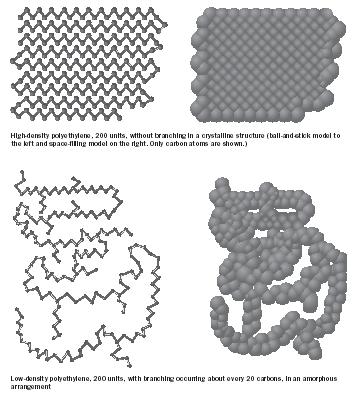

Nylon: Nylon, any synthetic plastic material composed of polyamides of high molecular weight and usually, but not always, manufactured as a fibre. Nylons were developed in the 1930s by a research team headed by an American chemist, Wallace H. Carothers, working for E.I. du Pont de Nemours & Company.

Artificial leather is a material intended to substitute for leather in fields such as upholstery, clothing, footwear and fabrics and other uses where a leather-like finish is desired but the actual material is cost-prohibitive or unsuitable.
Polymers are large molecules composed of repeated chemical units. The smallest repeating unit is called a mer. The term polymer is derived from the Greek words poly and mers meaning “many parts.”
Polymers are large molecules composed of repeated chemical units. The smallest repeating unit is called a mer. The term polymer is derived from the Greek words poly and mers meaning “many parts.”


Synthetic materials are made from natural resources. Synthetic materials are made by chemically changing the starting substances to create a material with different characteristics. Some examples of synthetic materials are plastics, medicines, and new fuels. A synthetic substance may be chemically
Celluloid: Celluloid, the first synthetic plastic material, developed in the 1860s and 1870s from a homogeneous colloidal dispersion of nitrocellulose and camphor. A tough, flexible, and moldable material that is resistant to water, oils, and dilute acids and capable of low-cost production in a variety of
Plastic is material consisting of any of a wide range of synthetic or semi-synthetic organic compounds that are malleable and so can be molded into solid objects.. Plasticity is the general property of all materials which can deform irreversibly without breaking but, in the class of moldable polymers, this occurs to such a degree that their
Nylon: Nylon, any synthetic plastic material composed of polyamides of high molecular weight and usually, but not always, manufactured as a fibre. Nylons were developed in the 1930s by a research team headed by an American chemist, Wallace H. Carothers, working for E.I. du Pont de Nemours & Company.
b. Not natural or genuine; artificial or contrived: “counterfeit rhetoric that flourishes when passions are synthetic” (George F. Will).
1: any of numerous strong tough elastic synthetic polyamide materials that are fashioned into fibers, filaments, bristles, or sheets and used especially in textiles and plastics



